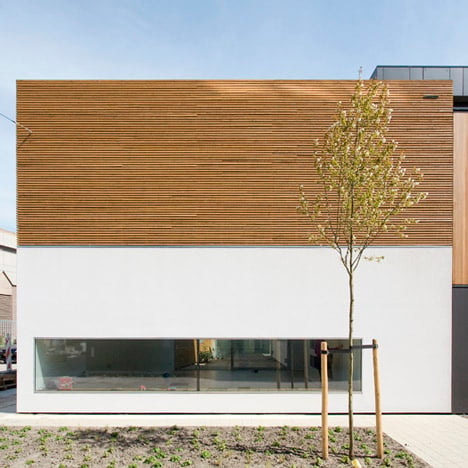Here's the next house in the series of eleven by Rotterdam studio Pasel Kuenzel Architects on the site of a former slaughterhouse in Leiden, Netherlands.
Named V12K0102, the house and its neighbours form part of an area masterplan by Dutch architects MVRDV.
The 30 metre-long building alternates between one and two storeys-high and is clad in a chequered pattern of timber and white render.
The house also features long narrow windows and a camouflaged front door.
A private courtyard splits the house into two halves, one occupied by the children and the other used by the parents.
This courtyard can be surveyed from a first floor deck, which also overlooks a second smaller courtyard on the opposite side of the building.
We've previously featured four houses from this series on Dezeen - see the projects here and see all our stories about Dutch houses here, including one with perforated fabric tacked onto its facades.
Photography is by Marcel van der Burg.
Here are a few additional words from Pasel Kuenzel Architects:
V12K0102 - 30 running meters of house!
On the site of a former slaughterhouse in the historical heart of the Dutch university city of Leiden, emerges one of the biggest urban developments of private dwellings in the Netherlands.
In their series of eleven, Rotterdam based architects pasel.künzel architects present yet another spectecular house giving a new interpretation of the classical Dutch housing typology.
With their V12K0102 residence pasel.kuenzel architects created a remarkable project on an almost triangular building plot, the remnant of an inner city housing block.
On a 30 metre long one-storey high base, two building volumes were placed on opposite side, one being the ‘children’s house’ and the other serving as the ‘house of the parents’.
The two parts facing each other allow for visible eye contact, but are furthermore physically separeted.
Collective spaces for living, dining and playing are situated on the ground floor, meandering around two intimate courtyards and establishing an immediate relation between ‘life inside and outside’ – an oasis in the city.
Towards the city, the introvert house reveals his inner life by only two gigantic glass panes that also permit the characteristic Dutch light to reach deep into the museum like spaces.

